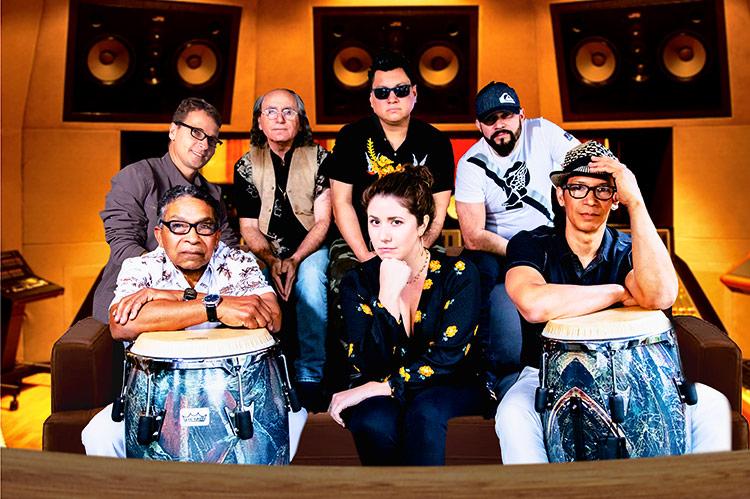Xenophobia, at its rotten core, is ignorance. And ignorance, as Anna Sewell’s “Black Beauty” has taught children since its 1877 publication, is the worst thing in the world, next to wickedness.
Rather, those making even a minimal effort to dispel ignorance and delusion might rejoice in diversity, and, to cite one example, the uniquely brilliant musical mash-ups that result when cultures intermingle.
Consider “King of the Bongo Bong,” a 1939 recording by the late American trumpeter Roy Eldridge, reworked decades later as “King of Bongo” by Mano Negra, a group founded in Paris by three relatives born to Spanish parents with Cuban roots, later still reimagined by Manu Chao, a co-founder of Mano Negra, then covered by the English singer Robbie Williams, and finally remixed ad infinitum by several other artists.
Or Lana Del Rey’s Southern California-cool cover of Sublime’s 1997 quasi-trip-hop hit “Doin’ Time,” itself based on “Summertime” by George Gershwin, an American composer of Russian and Lithuanian Jewish ancestry, from his 1935 opera “Porgy and Bess,” based on DuBose Heyward’s 1925 novel “Porgy,” set in the African-American community of Charleston, S.C.
Music, a proven change agent, brings people together. Life is a party, after all, or it could be.
These notions came to mind one recent evening in a basement in Springs that serves as the recording and rehearsal studio of Conga Cartel, a multigenerational, multinational band formed one year ago and made up of players from six countries. If the name is not familiar, it should be: Since gigs at Springs Tavern and the Montauk Music Festival last year, a reputation has spread, largely by word of mouth, of a new sound comprising a jumble of musical and cultural influences.
Conga Cartel will play on Saturday at 10 p.m. at the Stephen Talkhouse in Amagansett.
There are familiar songs in its repertoire — “Bongo Bong” and “Doin’ Time” among them — but Conga Cartel makes each song its own. The sound is decidedly Latin — the polyrhythms of its three percussionists assure it — but surprisingly unique.
South Fork music fans will remember the core of Conga Cartel as the band Mr. No-Shame. Willy Fuentes, from Chile, is its bassist and musical director. Fabian Rodriguez, who is from Ecuador, is on guitar, and Jorge Castano, from Columbia, is the drummer. On a range of percussion instruments, including timbales, bongos, djembe, and congas, are Aquiles Brito Sr., who is from Venezuela, and his son, Aquiles Brito Jr.
The band also includes the keyboardist Yudier Soca, who is from Cuba, and Carolina Kohn — “born in New York, raised in Uruguay, shaped in Europe” — on lead vocals (music fans may know her sultry delivery from the gypsy jazz-inspired Hot Club of Montauk). Conga Cartel recently added Dacia Burns, who is Dominican-American, on backing vocals.
“Ever since the first rehearsal, the chemistry was just off the charts,” said Ms. Kohn, who was introduced to Conga Cartel by Paul Hamilton, a guitarist in Hot Club of Montauk. “It was so natural, and just so much fun. We decided to give it a shot.”
“She was like the missing link in the band,” Mr. Rodriguez said.
“I was so impressed when I came down to this basement for the first time,” Ms. Kohn answered. “That chemistry shows. When you play for years, and especially Aquiles and Aquiles Jr., that chemistry between father and son, it’s undeniable.”
“We try to make it very dynamic,” said Mr. Rodriguez, who cited progressive rock and guitar heroes including Steve Vai and Joe Satriani as influences. “Because we listen to each other,” Ms. Kohn added.
Through Ms. Kohn, who served as translator, the elder Mr. Brito said that playing percussion “was just part of growing up” in Venezuela. “It was so natural for me. . . . It’s the beat of my country.” He mused about the African influences that permeated Latin America and the Caribbean. “Any Latin American country that has a coastline is strongly influenced by Africa.”
He and Mr. Fuentes are Conga Cartel’s elder statesmen, contributing foundational musical influences like Tito Rodriguez, the Puerto Rican singer and percussionist who found fame in New York City, and the Latin jazz pianist and composer Eddie Palmieri, born in Spanish Harlem to Puerto Rican parents, who played in Rodriguez’s band, among others, and at 83 remains a towering figure in jazz and salsa. Not surprisingly, Santana, the quintessential Latin rock ’n’ roll band, is an oft-cited influence on Conga Cartel.
Mr. Soca, Mr. Rodriguez said, “is also a big influence for us, because we need a Cuban flavor. There is something particular about his playing. You can’t get that from formal education, you have to grow up in that environment.”
“We do have that Latin feel,” Ms. Kohn allowed, “but we do American covers as well, English songs, and we want to make them our own. We don’t want to just be another cover band on the East End.” The group is working on original music, she said, and hopes to further develop its own catalog, “but when we play a cover we want to make it different, so it almost sounds like a completely different song.”
In addition to Saturday at the Talkhouse (admission is $10), Conga Cartel will perform with Rumba Liu in the next edition of East End Underground on March 20 at LTV Studios in Wainscott. Conga Cartel will return to the Talkhouse on April 4, and on May 22 — Ms. Kohn’s birthday — it will perform at Guild Hall in East Hampton.
The band offers “something different, something that was missing” on the South Fork, Ms. Kohn said. “The Latin community, which is huge out here, are our main fans, but not our only fans. At our shows, there are all sorts of people — all age ranges, all walks of life. It’s a fun time.” After all, she said, “Everyone likes to dance.”




